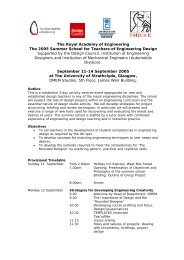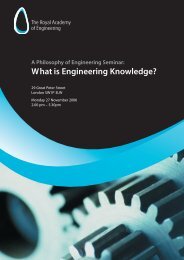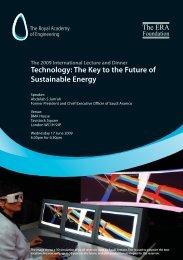Lecture Series in Mobile Telecommunications and Networks (1583KB)
Lecture Series in Mobile Telecommunications and Networks (1583KB)
Lecture Series in Mobile Telecommunications and Networks (1583KB)
You also want an ePaper? Increase the reach of your titles
YUMPU automatically turns print PDFs into web optimized ePapers that Google loves.
I said five years ago <strong>and</strong> what I hear now is that they are say<strong>in</strong>g that they don’t like people talk<strong>in</strong>g that much because<br />
they have flat rates – so they should not talk at all. [Laughter]<br />
Andrew Poh (Qualcomm): I am speak<strong>in</strong>g <strong>in</strong> my own personal capacity <strong>and</strong> I have three questions. The first is just for<br />
clarification on my part because I may have missed someth<strong>in</strong>g. You mentioned the turbo error protection <strong>and</strong> the use<br />
of iterative source channel cod<strong>in</strong>g. Do you see this as someth<strong>in</strong>g that you would use on the receiv<strong>in</strong>g side of the<br />
h<strong>and</strong>set? You will probably <strong>in</strong>cur some latency, go<strong>in</strong>g through the turbo error protection, as you go through a few<br />
iterations.<br />
Peter Vary: You can apply it to any st<strong>and</strong>ard transmission system. We have applied it just to pla<strong>in</strong> GSM. You do not<br />
need to change the transmitter but you can do it just at the receiv<strong>in</strong>g end by additional process<strong>in</strong>g <strong>and</strong> exchange of<br />
<strong>in</strong>formation between the channel decoder <strong>and</strong> the source decoder. However, if you study that <strong>in</strong> greater detail, you will<br />
discover that you can further improve if you modify the transmitter but it is a matter of the environment <strong>in</strong> which you<br />
apply it. If we were start<strong>in</strong>g to th<strong>in</strong>k about a new radio st<strong>and</strong>ard, then we would say that you should not use Gray<br />
cod<strong>in</strong>g, for example, <strong>in</strong>dex mapp<strong>in</strong>g at the transmitter, but there are better solutions. We can improve the exist<strong>in</strong>g<br />
system.<br />
Andrew Poh: Is that applicable for real time volume, s<strong>in</strong>ce there will be some latency if you go to - ?<br />
Peter Vary: There are two sources of latency. One is the <strong>in</strong>terleaver <strong>and</strong> we have it there, <strong>and</strong> it is sufficiently large.<br />
The second is some latency due to process<strong>in</strong>g but, <strong>in</strong> any case, you have to do the process<strong>in</strong>g before the next packet<br />
arrives <strong>and</strong> so you have to <strong>in</strong>crease the process<strong>in</strong>g speed. The turbo decod<strong>in</strong>g as such, therefore, will not <strong>in</strong>crease the<br />
latency.<br />
Andrew Poh: My second question follows on from the question asked earlier. There was the question about the use<br />
of AMR wideb<strong>and</strong> <strong>and</strong> I guess this has been debated <strong>in</strong> the mobile community for quite some time. The operators will<br />
always argue that no one is really will<strong>in</strong>g to pay any extra for it <strong>and</strong> so they have been dragg<strong>in</strong>g their heels, <strong>and</strong> we have<br />
seen that happen<strong>in</strong>g. They always say that it will be this year, but it never happens.<br />
With the <strong>in</strong>troduction or st<strong>and</strong>ardisation of AMR wideb<strong>and</strong> <strong>and</strong> 3GPP, it is tak<strong>in</strong>g an awfully long time. Companies like<br />
Skype, as we know, have this week <strong>in</strong>troduced a new wideb<strong>and</strong> speech codec. Is it possible that do<strong>in</strong>g that on a<br />
packet-switch network, us<strong>in</strong>g perhaps a W<strong>in</strong>dows mobile phone <strong>and</strong> just download<strong>in</strong>g the codec, would be quicker<br />
than gett<strong>in</strong>g the <strong>in</strong>dustry together to <strong>in</strong>troduce AMR wideb<strong>and</strong> over a circuit switched connection?<br />
Peter Vary: Yes, that is what we hear. There is a consensus that if we have UMTS LTE it will be packet transmission <strong>and</strong><br />
then there will be greater flexibility <strong>and</strong> more convergence with the <strong>in</strong>ternet world. However, we should be careful here<br />
because latency is an issue, the headers are an issue, <strong>and</strong> the frequency/economy is an issue, as is the energy efficiency.<br />
If you require short latency, the packets are short but you have the header <strong>and</strong> you could discover that you double the<br />
number of bits you have to transmit <strong>and</strong> therefore you need to improve protocols, header compression <strong>and</strong> techniques<br />
like that – at least on the air <strong>in</strong>terface, <strong>and</strong> then you go <strong>in</strong>to the fixed network. I am pretty sure that the future will be IP.<br />
Andrew Poh: My third question is someth<strong>in</strong>g which you perhaps touched upon <strong>in</strong> your very excellent presentation:<br />
3GPP works like someth<strong>in</strong>g like distributed speech recognition. Obviously, they also debated whether to use someth<strong>in</strong>g<br />
for speech communication or whether to go for a totally different codec which is optimised for mach<strong>in</strong>e recognition, a<br />
speech recognition type of th<strong>in</strong>g. Would you be able to comment on the use of a codec for speech recognition?<br />
Peter Vary: The idea is to do the speech recognition task not <strong>in</strong> the mobile but to have <strong>in</strong> the mobile just the feature<br />
extraction: you don’t transmit the speech, but you extract the features. You save computational power <strong>in</strong> the mobile<br />
<strong>and</strong> you have a very powerful processor <strong>in</strong> the fixed network. The idea is not that bad, but I am not sure. I am not sure<br />
about speech recognition at all. We have been hear<strong>in</strong>g for years that there will be a breakthrough with<strong>in</strong> the next one,<br />
two or three years. As the quality is hopefully <strong>in</strong>creas<strong>in</strong>g <strong>in</strong> the network, if you have wideb<strong>and</strong> cod<strong>in</strong>g, the question is<br />
why should we do the parameter extraction <strong>in</strong> the mobile <strong>and</strong> the recognition task <strong>in</strong> the central switch<strong>in</strong>g office?<br />
If we check the bit rates for a codec like the AMR codec, you will see that roughly 50 per cent of the bit rate is for the<br />
parameters of the vocal tract <strong>and</strong> the model, <strong>and</strong> this is exactly the <strong>in</strong>formation you need for speech recognition. You<br />
will not save that much <strong>in</strong> terms of bit rate. I know that there is st<strong>and</strong>ardisation <strong>and</strong> that there are some very nice,<br />
<strong>in</strong>terest<strong>in</strong>g research topics, but I do not really see that as the future of speech recognition. I don’t know.<br />
58 The Royal Academy of Eng<strong>in</strong>eer<strong>in</strong>g

















